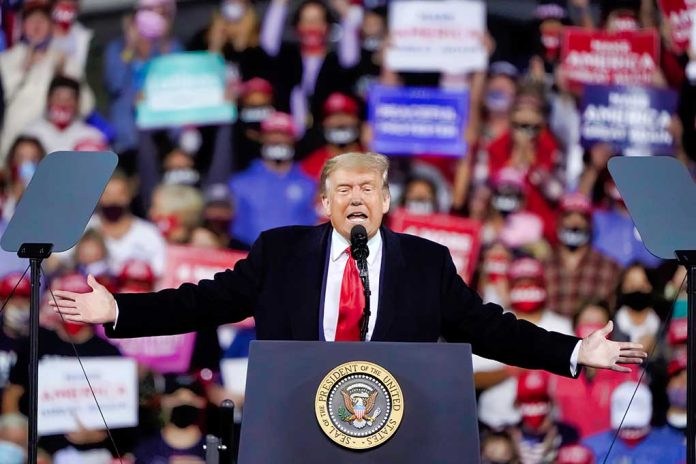
Former President Donald Trump declines future debates, citing strong polling and past performances as he focuses on his campaign strategy.
At a Glance
- Trump reiterates decision to refuse participation in future debates
- Cites confidence in strong polling numbers supporting him
- Dismisses Vice President Kamala Harris’s appeal for another debate
- Emphasizes priority on leadership responsibilities over debate engagement
- Race remains close with 34 days until Election Day
Trump’s Debate Stance and Campaign Focus
In the wake of the vice presidential debate between Senator JD Vance and Governor Tim Walz, former President Donald Trump has reaffirmed his decision to abstain from future debates. Trump’s stance comes as he expresses unwavering confidence in his polling numbers and previous debate performances against both President Joe Biden and Vice President Kamala Harris.
Trump’s decision to forego additional debates aligns with his campaign strategy of focusing on his leadership agenda rather than engaging in televised verbal sparring. This move has sparked discussions about the impact of debates on voter preferences and the overall trajectory of the presidential race.
Post-Debate Landscape and Campaign Activities
Following the vice presidential debate, both campaigns have shifted their focus to key battleground states. Senator Vance is heading to Michigan, while Governor Walz plans to tour central Pennsylvania alongside Senator John Fetterman. These campaign activities underscore the tight race, with both sides vying for crucial swing state support.
“Voters aren’t stupid,” a spokeswoman, Sarafina Chitika, said in a statement. “They heard Trump brag about killing Roe, heard him when he called for ‘punishment’ for women and heard him call the extreme Trump bans he made possible ‘a beautiful thing to watch.'”
The Harris campaign’s statement highlights the ongoing debate over abortion rights, a key issue that continues to divide voters and shape campaign narratives. Meanwhile, Trump’s team is preparing for a remembrance ceremony marking the one-year anniversary of the October 7 Hamas-led attack on Israel, demonstrating a focus on foreign policy and national security issues.
Debate Impact and Voter Sentiment
Despite the attention garnered by debates, historical trends suggest that their impact on voter preferences is often limited and short-lived. The recent vice presidential debate, while civil and policy-focused, did not produce a memorable moment likely to sway undecided voters significantly. This reality may have influenced Trump’s decision to avoid future debates, as he prioritizes other campaign strategies.
Trump declines second CNN debate: "I've already done two…The problem with another debate is that it's just too late. Voting has already started. She's had her chance to do it with Fox. Fox invited us on, and I waited and waited. They turned it down." pic.twitter.com/rhispm3zVZ
— CSPAN (@cspan) September 21, 2024
As the election draws nearer, both campaigns are intensifying their efforts in battleground states, with early voting approaching. The focus has shifted to fund-raising events and targeted campaign stops, reflecting the understanding that direct voter engagement may be more effective than televised debates in swaying public opinion.
Looking Ahead
With Trump’s decision to decline future debates, the campaign landscape is evolving. Both sides are adapting their strategies to maximize voter outreach and support. As Election Day approaches, the focus will likely remain on key policy issues, campaign promises, and direct appeals to voters in crucial swing states.
The coming weeks will be critical for both campaigns as they navigate the final stretch of the election season. Trump’s confidence in his polling numbers and past performances will be put to the test, while the Harris campaign continues to push for opportunities to engage directly with voters and challenge Trump’s policy positions.







